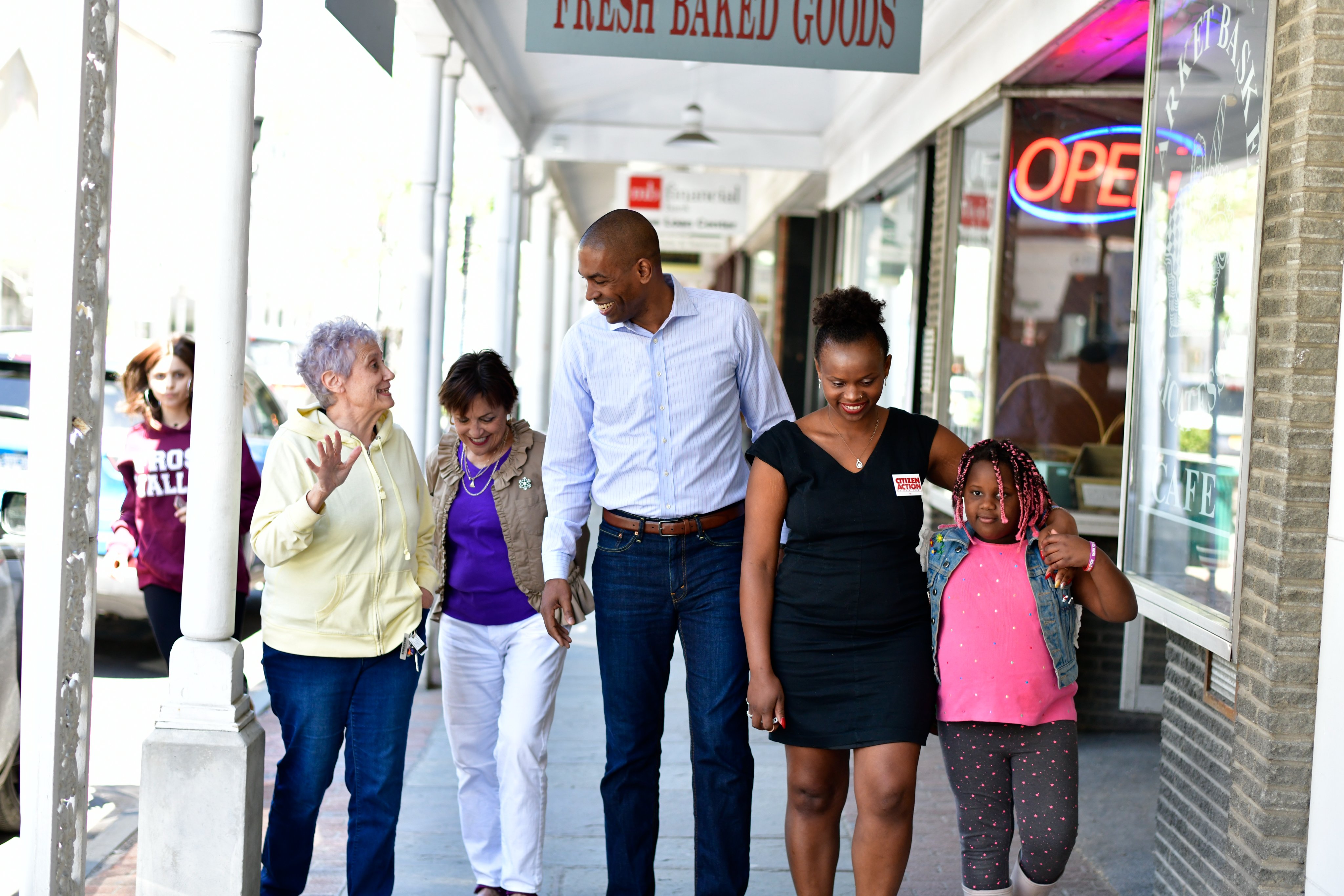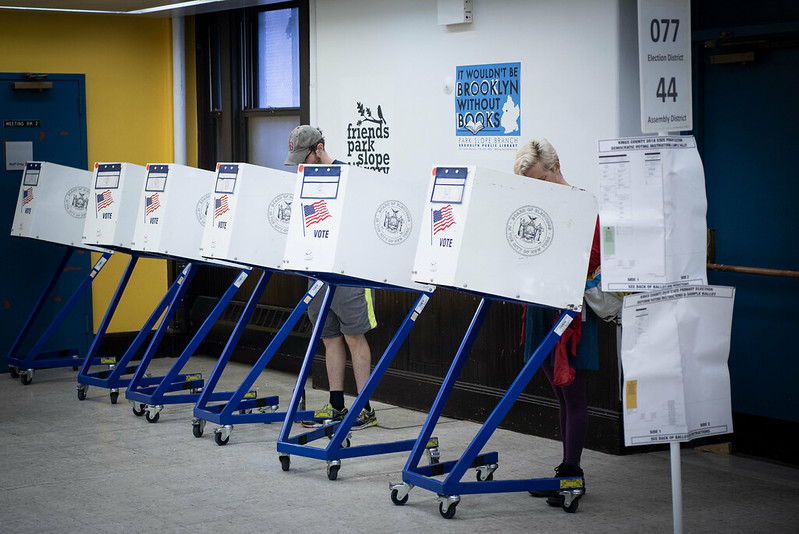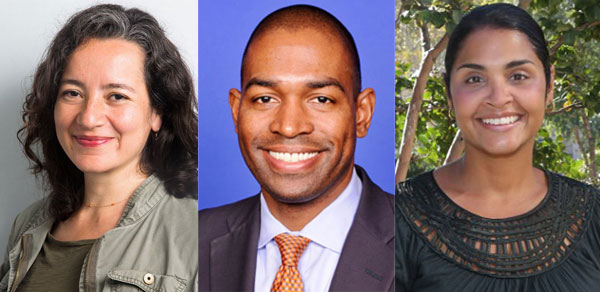It’s Darkest Just Before The Dawn

Lt. Gov. Antonio Delgado, middle (photo: @DelgadoforNY)
Every single day you can turn on the news and find evidence of the hate and divisiveness that roils our state and infects our country. From conspiracies in our capitol, to crime in our community, to hate in our hometowns, there are dark and dangerous forces at work in America today. Whether it’s hatred that’s spreading in dark corners of the internet or the highest court in our land making devastating decisions to control what women do with their bodies, our very freedoms are being taken from us.
Many are raised and taught to hate. Others are imbued with a deep fear that their status and power in society is at risk so they choose to hate. And many more, too many more, are merely using division and hate to amass more power for themselves. It’s all destructive, dark, and ugly.
As a wise leader once told our country, “A house divided cannot stand.” They are words to remember these days.
But, when I look at my two young twin boys – born to a Black father with Cape Verdean and Latino roots and a mother who is Black and Jewish – my resolve that we can heal this division is reaffirmed. It won’t be easy. It won’t happen overnight. There will be steps backward at times, but we will keep marching forward.
The merchants of conspiracy and peddlers of hate are doing all they can to eliminate objective reference points, to disregard truth and defy reality. They know that is their only path to power. But I grew up learning something different.
Growing up in Schenectady, I was raised by two proud parents in a working class family. They instilled in me values of faith, hard work, discipline, and love. We spent every Sunday at Macedonia Baptist Church, in the 2nd middle pew. It’s those values which stick with me today. Too many of our politicians make decisions based on left versus right politics. Based on who’s up and who’s down. Instead, what we need is public servants who make decisions based on right versus wrong. That’s how we start to restore faith in government, attachment in community, and heal our divisions.
My path to politics wasn’t meticulously laid out. After earning a Rhodes Scholarship and graduating with a Harvard Law degree, I followed my heart to become a hip hop artist in Los Angeles. After five hard years living on air mattresses and doing odd jobs, I came back to New York to start our family. And I joined a corporate law firm in New York City. Those diverse experiences are what give me confidence that we can bridge divides today.
When I first stepped into public life to run for Congress, those same agents of intolerance and promoters of division came after me. They took lyrics and photos from my career as a hip hop artist and tried to use them to divide the mostly white community I was seeking to represent in Upstate New York. Guess what? It didn’t work. In a district that’s nearly 90% white, the 8th most rural district in our entire country, and one that decisively voted for Donald Trump in 2016, they elected the first person of color to represent Upstate New York in Congress. Anyone who believes that divisive politics will always triumph, needs to become a better student of history.
When I first got to Congress, my team asked me what we wanted to do. I told them we wanted to do town halls in every part of my district, three per county – 33 in total – in the first year. And, I told them to start in places that disagreed with me the most. We can’t reconnect with people if we aren’t willing to listen and to dialogue.
And, it worked. I got re-elected to a district that Trump had won a few years earlier. The meaningful connection with people gave them confidence to trust me – even when they didn’t always agree with me.
You can’t be people's voice if you don’t hear them. And you can’t hear them if you don’t listen to them. That’s what I intend to do as Lieutenant Governor and have already begun doing. That’s how we begin to reconnect with people who feel detached. That’s how we begin to undo the division that so many are spreading. That’s the work.
Some will claim I’m naïve about what we’re up against out there. Nothing could be further from the truth. I’m well aware of the challenge in front of us but also aware that the only way to win this battle for hearts and minds is to heal from a place of love. People aren’t born to hate. They are taught to hate. We have to begin the long, hard, difficult work of helping them unlearn what they have learned.
If we truly believe in being on the right side of history then it’s the only option we have.
As it says on the very motto of our nation, E pluribus unum – Out of many, we are one.
***
Antonio Delgado is Lieutenant Governor of New York and a former member of Congress representing New York’s 19th Congressional district. On Twitter @DelgadoforNY.
***
Have an op-ed idea or submission for Gotham Gazette? Email This email address is being protected from spambots. You need JavaScript enabled to view it.
New York’s Opportunity to Advance Two Great Choices to the General Election for Governor

Voting is underway (photo: Michael Appleton/Mayor's Office)
New York is at a crossroad. Our state faces many challenges, including a resurgent virus, rising gun violence, and political turmoil. We need a Governor who is up to those challenges, who can build consensus in addressing them, who can restore ethics and integrity and honesty to our state government, and who can make us proud again.
Fortunately, there are such candidates running on both sides of the aisle. That is why Citizens Union, where I am Chair of the Board, prefers Kathy Hochul in the Democratic primary and Harry Wilson in the Republican primary for Governor.
For 125 years, Citizens Union, New York's preeminent, non-partisan "good government" group, has been endorsing state and local candidates who share its mission of promoting honesty, integrity, ethics, accessibility, transparency, and accountability in government. In 2020, because our democracy was literally at stake, we even chose for the first time in our history to endorse in a U.S. presidential race, recommending Joe Biden over Donald Trump.
And once again, this year, the stakes are high for New York, raising the importance of voters’ choices.
Governor Kathy Hochul stands out in a strong Democratic field. She assumed the office under daunting circumstances, with covid raging and the state engulfed in a political scandal that forced yet another New York governor to resign in shame.
Since then, Hochul has proven to be an effective consensus-builder. One of her first promises was to “change the culture of Albany,” and she indeed brought a new style of governing that was sorely needed. Her collaborative approach allowed her to build strong working relationships with the State Legislature and New York City's Mayor, a rarity in New York. And she has assembled a professional team of dedicated public servants to help her achieve her agenda.
Hochul has also taken steps to advance government ethics reforms that had no chance of moving forward in the previous administration, like restructuring the state’s ethics watchdogs. She has signed legislation and committed to pursuing policies to strengthen New York’s democracy, including modernizing the state’s antiquated election administration system and supporting a public campaign finance program.
But there are challenges ahead, like reducing crime, fixing the problems with bail reform, preventing future gerrymandering, and protecting a woman’s right to choose. And there is more to be done to be transparent and maintain the public trust. (Hochul admits, for example, she could have done a better job disclosing the plan to fund the Buffalo Bills stadium project.) She is learning on the job and proving to be a quick study. She understands the issues and seems poised to tackle them.
Hochul's Democratic challengers bring vastly different experiences to the race. Tom Suozzi, who has distinguished himself as a Congressman and Nassau County Executive, received support from some Citizens Union board members for his proven record of success as a government executive, his pragmatic approach, and his focus on public safety. Jumaane Williams, New York City's Public Advocate, has been a tireless advocate for progressive causes. But it is Hochul who has built a broad coalition and risen above the field.
Harry Wilson is by far the class of the Republican primary field. An outsider who wants to clean up Albany, he has a proven track record of success in business as a turnaround specialist, something that our state surely needs.
He was one of the leaders of President Obama’s auto industry rescue task force during the Financial Crisis and later mounted a very credible race for State Comptroller, which he almost won.
Wilson brings a refreshing perspective to running state government and tackling its dysfunctions. Ethics reform is a top priority for him – he launched his campaign platform with a government reform and accountability plan – and he has proven to be a person of the highest integrity and an independent voice who speaks the truth to power within his own party.
Although he differs from Citizens Union on some major issues, such as public campaign financing, Wilson has demonstrated a willingness to cross the aisle and work collaboratively. For example, he would maintain New York law protecting a woman's right to choose. In short, he would be a formidable candidate in the general election.
The other candidates seeking the Republican nomination for Governor -- Lee Zeldin, Andrew Giuliani, and Rob Astorino – all continue to follow Donald Trump's lead and spread misinformation about the validity of the 2020 presidential election. That alone should be disqualifying. There's right, and there's wrong. And at this fragile time in our democracy, they are simply wrong. Harry Wilson speaks the truth, and that is why he is Citizens Union's preference in the Republican primary.
As the primaries are decided in the coming days, we urge all eligible New York voters to do their civic duty, exercise their right to vote, and give themselves great options for the general election to lead our state.
***
Randy Mastro is the Chair of Citizens Union's board and a partner in the law firm of Gibson, Dunn & Crutcher.
Road to the Lieutenant Governor's Office Runs Through the Barrios of New York

(l-r) Ana Maria Archila, Antonio Delgado, Diana Reyna
Until results are officially released, who will win an election is uncertain. But right now, with less than a week until election night in this year’s statewide primaries, one thing is quite certain: the next Democratic nominee for Lieutenant Governor will have a Latino name. And yes, that even includes Antonio Delgado, whose racial and ethnic identity has been the subject of much debate.
The fact that Delgado, Ana Maria Archila, and Diana Reyna are the three Democratic candidates on the ballot for Lieutenant Governor speaks to the growing importance of Latinos in state politics. Indeed, with Latinos now forming almost 20% of all registered Democratic voters statewide, the Latino vote is not one to take for granted.
Governor Hochul evidently knows this, as she and the State Democratic Party recently launched the Nueva York Initiative. Jumaane Williams’ campaign and the New York Working Families Party as a key organizational engine were instrumental in launching Archila’s candidacy. And Tom Suozzi asked Reyna to be his running-mate.
Having two Latinas as Lieutenant Governor candidates can be a boon for Latino voting participation. Several studies have shown that having a Latino at the top of the ballot does improve voting participation among the group. This was certainly the case in New York City when Fernando Ferrer became the first Latino to win the mayoral nomination of a major political party here. Latino voting participation increased by almost 40% in many of the Latino-majority election districts in his 2005 bid for Gracie Mansion. While the Lieutenant Governor race is not at the top of the ballot, it is right below the top, and can still garner enough attention to make some voters pay attention.
Can the candidacies of Archila, Delgado, and Reyna help increase Latino voter turnout across the city and state?
It depends. Boosting Latino turnout encompasses a number of things, like investing precious candidate time and financial resources in Latino neighborhoods, speaking to voters on the ground and through the airwaves.
It means meeting Latinos where they are. Paying lip-service will no longer work. In recent elections, we have seen numerous Latinos abandon their loyalty to the Democratic Party. Latino voters pay attention. And many more are going to the polls.
It also means investing money in Spanish-language TV and radio stations, and local papers. To be sure, voters of all ethnicities expect and respond positively to personal interactions with candidates. That is especially the case with Latinos, who expect candidates to be uno de ellos/ellas (“one of us”). Latinos enjoy the interaction and the excitement that campaigns generate and want the issues they care about dealt with, from small businesses to education to public safety to affordable housing and more.
So far, the potential for excitement is largely missing in Latino communities across the city and state. With just under a week to go before primary election day, the three lieutenant governor candidates have a lot of work to do to generate more buzz among Latinos.
It appears that so far only Delgado has bought advertisements on the major Spanish-language TV stations. Naturally, paying for pricey commercials entails having a large campaign kitty. Delgado was able to transfer millions of dollars from his congressional campaign account and, as the governor’s running-mate and current lieutenant governor, will have the most money of the three candidates and thus more resources than others to do so.
Of the three, Archila has the most endorsements from Latino elected officials, with 14. Delgado and Reyna each have four. Voters are not entirely swayed by endorsements, but endorsements can matter and can mean access to fundraising sources and personnel to launch on-the-ground operations to speak directly to voters.
Such endorsements will be pivotal, especially for Archila. Up to now, Archila seems to be running a somewhat similar campaign to Dianne Morales’ in last year’s mayoral primary, in that she appears focused on establishing and fortifying her progressive base as opposed to focusing on appealing to Latinos. While this progressive base has made possible the creation of a much-needed multi-racial coalition, the coalition is mostly driven by a political philosophy not embraced by a good chunk of the Latino Democratic primary electorate, which is more moderate. Moreover, the majority of likely Latino primary voters are 55 years of age and over, and many of these voters tend to be less progressive than younger ones.
Nevertheless, Archila’s story is one that can certainly appeal to a broad spectrum of Latino voters. Like many Latinos across the Empire State, Archila immigrated to the United States in her youth — she came from Colombia when she was 17 years old. Undeterred by the challenges immigrants face on a daily basis, she dedicated her life to advocacy, co-founding Make the Road New York, a pivotal group doing important immigrants rights work across the state, and launching efforts to combat economic and racial injustice. Archila became nationally known for directly confronting U.S. Senator Jeff Flake during the Supreme Court nomination process of Brett Kavanaugh.
Diana Reyna also has a narrative that can appeal to many Latinos. The daughter of Dominican immigrants, Reyna became the first Dominican woman to be elected to a government position in the state of New York when she ascended to the New York City Council. She then became a deputy borough president under then-Brooklyn Borough President Eric Adams. Yet, Reyna’s lack of financial resources and her inability to identify and energize a natural base for her candidacy will likely lead her to defeat.
In the end, the Lieutenant Governor primary race will probably come down to Archila and Delgado. Delgado is formidable, not because he has a Latino surname, but because of his campaign war chest, his access to the state Democratic Party apparatus and many allies in organized labor, and by virtue of currently holding the position, albeit one he has not held for much time, which comes with additional support from Governor Hochul.
Delgado’s success or defeat may be determined by Hochul’s coattails, or lack thereof. And when it comes to the Latino vote in New York, he will have a lot of work to do, particularly since 75% of the Latino vote will come from New York City. Delgado is from upstate and is largely an unknown entity, especially among Latinos, in New York City.
Does the road to Albany cross through the Latino barrios of New York? Perhaps. One thing is certain—the next Democratic nominee for Lieutenant Governor will have a name that is familiar in those same barrios.
***
Eli Valentin is a political analyst and author of the forthcoming book, Reinhold Niebuhr: A Political Life. On Twitter @EliValentinNY.
***
Have an op-ed idea or submission for Gotham Gazette? Email This email address is being protected from spambots. You need JavaScript enabled to view it.




